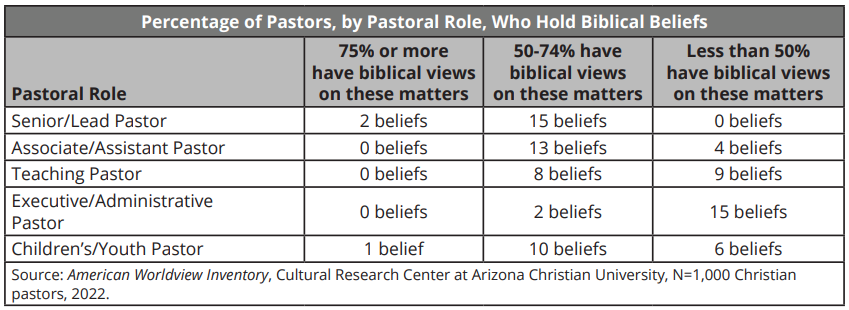
What do you expect from your church? Biblical preaching? A community where biblical values are exemplified by clergy and laity alike? A recent poll from George Barna’s Cultural Research Center (CRC) indicates that these are no longer reasonable expectations in American churches.
The CRC poll surveyed 1000 pastors from a variety of ecclesial traditions (Evangelical Protestant, Mainline Protestant, Roman Catholic, Black Protestant, etc.), asking them to evaluate 54 worldview-related statements such as “Having faith matters more than which faith you have;” or “the Bible is ambiguous regarding abortion; it is possible to make a compelling biblical argument either for or against abortion.” On the basis of their responses, it would appear that a mere 37 percent of Christian pastors in the U.S. possess a biblical worldview.
Among evangelical pastors, a biblical worldview was somewhat more common, but the numbers are hardly encouraging: only 51% percent of pastors in traditionally conservative denominations (Southern Baptist Convention, Presbyterian Church in America, Evangelical Free Church of America, Lutheran Church–Missouri Synod, etc.) met the standards for a biblical worldview.

The American Church, it seems, has fallen from its calling to be “the pillar and ground of the truth” (1 Tim. 3:15). This begs the question, what is the Church teaching? If America’s pastors don’t have a biblical worldview, what kind of worldview is being propagated in America’s churches? The CRC poll’s results indicate that 62 percent of American pastors have a syncretistic worldview—a hodge-podge of biblical theism and whatever secular ideology was in vogue last Tuesday. One-third or more of senior pastors surveyed affirmed the statements “socialism is better than capitalism” and “sexual relations between two unmarried people who believe they love each other is morally acceptable.”
The problem, however, doesn’t just lie with America’s clergy. The results of the CRC’s poll implicate the laity as well. As St. Paul says, “the time will come when they will not endure sound doctrine; but after their own lusts shall they heap to themselves teachers, having itching ears; and they shall turn away their ears from the truth, and shall be turned unto fables” (2 Timothy 4:3-4). America’s churchgoers, it would seem, have lost their taste for sound doctrine and would much rather have their itching ears tickled with pleasant words—words that won’t require them to stop sleeping around; words that won’t tell them to stop voting for pro-abortion candidates just because they were promised student loan forgiveness.
As bleak as the situation would appear to be, the solution is wonderfully simple: find a church that preaches the Word of God. Find a church that reads and/or exhorts passages of Scripture every Sunday. Find a church that isn’t afraid of taking on the cultural issues of the day and understand that the Bible is profitable “for teaching, for reproof, for correction, for training in righteousness.” (2 Timothy 3:16) Find a church that administers the sacraments in accordance with God’s Word. Find a church where the only new words you’re worried about your kids learning are words like “justification” and “eschatology.”
Moreover, if a faithful, Bible-believing church doesn’t exist in your community, is it too much to pull up stakes and move somewhere there is such a church? Or how about starting a new church? We are commanded to “test all things and hold fast to what is good” (1 Thessalonians 5:21) and if your church can’t be trusted to show you and your family how to do that, it’s high time you found another church. And above all, every one of us ought to be praying that God would raise up men in our nation who, like St. Paul, can say “Imitate me, just as I also imitate Christ…” (1 Cor. 11:1).

































